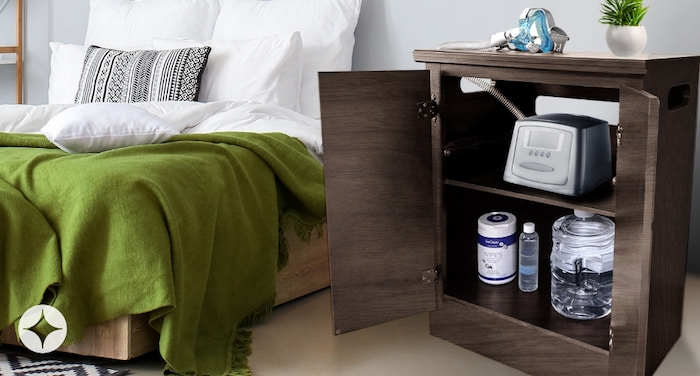Pictured: SoClean Sleep Equipment Nightstand. Learn more.
Even if you sleep in the dark and can't see the clutter around you, it will likely negatively impact your sleep. Your bedroom is where you start and end your day, and when it's a mess, it's hard to unwind, rest well or achieve mental clarity because the clutter may overstimulate the brain. As a result, your brain can associate the bedroom with stress, further negatively impacting your sleep quality. By creating an organized bedroom, you can boost your sleep quality and wake up feeling more rested and ready to take on the day.
Clutter and Your Sleep
If the last thing you see before going to sleep is a cluttered space that leaves you feeling overwhelmed and stressed, you're likely to toss and turn as the need to clean your space eats at you — and this tension can carry on into the next day. Your bedroom should be a calming sanctuary where you can rest completely, not a stressful, disorganized space. Here are some of the most common things that can clutter your bedroom:
- Work-Related Documents and Items: The bedroom should be reserved for sleep and bonding with your partner (if you have one), and anything else should be out of the room, especially work-related items. These can distract you and keep you from resting.
- Mess: Dirty clothes, old cups and empty water bottles, as well as other random mess, can distract you from sleep by making you think about how much you have to clean.
- Stimulating Colors: Bright, stimulating colors might be fun to look at, but they can also keep you awake. Choose bedroom decor and art with calmer colors to set a relaxing tone and promote good sleep hygiene.
- Light Clutter: In the last hour before you sleep, make sure you start dimming the lights so your body gets the hint that it's almost time to rest. Block outside light with blackout curtains.
- Noise Clutter: Sleep is best when you're in a dark, quiet environment, so try to keep your bedroom as quiet as you can. Noise from cars, electronics or other pollutants can all keep you up and worsen your sleep quality; thankfully there are many affordable options for blocking even outside noise.
- Screens: Screens tend to emit blue light, which tells our brains it's time to stay awake. Ditch the screens for at least an hour after bedtime and pick up a book instead.
- Anything You Don't Need to Sleep: Your bedroom can quickly become another storage area for books, art supplies and other random objects, but the clutter can keep you awake long after bedtime. Stick to the basics in your bedroom and find somewhere else to store your hobby supplies and collections.
Declutter Your Room for Better Sleep
It doesn't take much to prepare your bedroom for quality sleep. Try implementing these simple steps, along with eliminating common types of clutter, to get better rest.
- Choose Furniture With Purpose in Mind: Choosing practical furniture, such as nightstands, shoe storage and dressers, can help you get better sleep. Select a nightstand with built-in storage — this can be helpful to house sleep equipment and accessories for those who have sleep disorders. Nightstands can also house items you want easy access to, including a book, medication or water bottle.
- Set Aside Items You Aren't Using: Eliminate any unnecessary furniture, apparel you don't wear and gadgets that aren't working from your space. Divide items that are no longer useful to you by things to toss and donate. This will incentivize you by giving you a sense of purpose and making you feel accomplished.
- Keep Only What You Need: Select comfortable furniture, bedding and decor so you can enjoy the serenity of your organized room. While some types of bedding and art may be visually appealing, they may not be conducive to sleep. Choose textiles that are minimal in style and a subtle color. Most importantly, keep just enough of what you need to be comfortable, such as avoiding excess pillows or trinkets.
- Dust and Clean Regularly: By keeping your space clean and free of dust, you can improve your sleep quality, especially if you have allergies, asthma or other breathing conditions that may be exacerbated in a dusty environment. Do a thorough clean of your space, including washing your bedding, and dust well once per week for best results.
By transforming your bedroom into a clean, clutter-free space, you provide yourself with a solid foundation for healthy, restful sleep. With better sleep, you might just see a boost in daytime energy and reduced stress levels.





